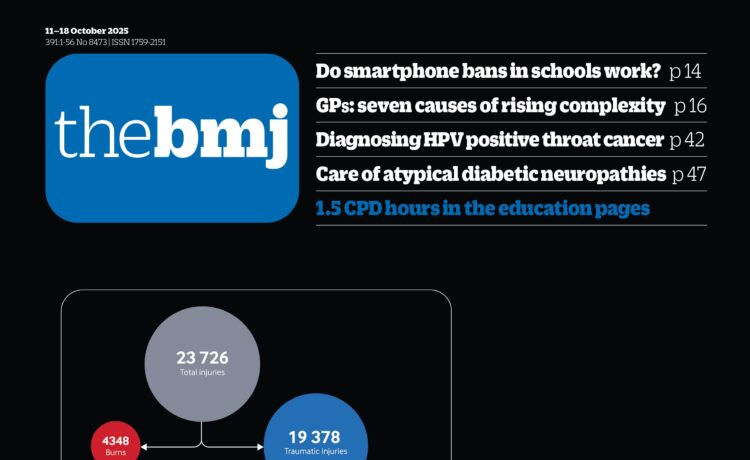Pharmaceutical pricing policies must prioritise patients and public interest over industry profits, say Els Torreele and Martin McKee
Pharmaceutical companies are intensifying pressure on the UK government to relax the long standing drug pricing controls that underpin the NHS.1 Their central demand is for higher prices on branded medicines. This domestic dispute is unfolding within a broader international context, with US policies seeking to impose higher prices abroad,2 aggressive global pharmaceutical lobbying, and post-Brexit regulatory uncertainty.
The UK has sought to position itself as a global life sciences hub, but this ambition has also made it vulnerable to industry demands.3 The UK must resist efforts to weaken price controls. It should instead reinforce a public interest driven pharmaceutical policy, working with its European neighbours, that protects the NHS’s financial sustainability and ensures equitable access to affordable drugs.
The UK has long relied on a combination of pricing policies to ensure that the NHS can provide access to effective medicines while maintaining financial sustainability. Two tools underpin this approach.4 First, the National Institute for Health and Care Excellence (NICE) applies a cost effectiveness threshold—typically £30 000 per quality adjusted life year—to determine if new treatments offer sufficient therapeutic value for public funding. Second, the voluntary scheme for branded medicines pricing, access, and growth (VPAG) caps annual growth in branded drug spending and requires manufacturers to pay rebates when spending exceeds agreed limits. These mechanisms help ensure that limited resources are directed towards interventions with the greatest health impact.
Similar approaches have been adopted by other European countries, including fostering greater transparency on research and development costs, public contributions, and actual prices to inform and improve policy making.5 They are a manifestation of the European social contract that balances public and private investments in health innovation to improve health outcomes while ensuring the affordability and sustainability of health systems.6
Pharmaceutical companies are increasingly challenging these policies.7 Citing inflation, rising production costs, and global pricing dynamics, particularly the influence of US “most favoured nation” pricing rules, which tie US drug prices to those in other countries. Pharmaceutical industry leaders argue that UK prices are unsustainably low.8 Yet their arguments often rely on exaggerating the costs of developing new drugs,9 while their prices are not justified by the actual costs of research and development or the quality of therapeutic innovation delivered.10 Their arguments overlook how a substantial share of pharmaceutical revenues is diverted towards shareholders, through stock buybacks, dividend payouts, and inflated executive salaries, rather than reinvested in innovation or access.11 They also ignore how weak price regulation in the US has caused drug prices to soar. Healthcare is the leading cause of bankruptcy in the US12 and many patients are forced to ration or forego lifesaving treatments as a result.13 Despite the weaknesses in the industry’s arguments, it is increasingly leveraging its economic muscle, warning that continued price controls could lead to disinvestment, job losses, and the relocation of research and manufacturing to the US or other more “industry friendly” jurisdictions.
The UK’s policies, once seen as a model of therapeutic value based pricing, are now viewed by companies as a threat to growing global profit margins. Weakening the UK’s drug pricing controls would have serious consequences for the NHS and the public it serves. Allowing higher prices for branded drugs would substantially increase NHS pharmaceutical spending, diverting funds from other essential services without delivering more innovation. Given the NHS’s already stretched budget, these opportunity costs could translate into greater unmet need, reduced service quality, and widening health inequalities.
Industry claims that high drug prices are necessary to sustain innovation and investment lack evidence and obscure the aggressive tactics used to shape favourable policy environments.14 Pharmaceutical companies routinely exert pressure on governments through lobbying, legal threats, and closed door negotiations for tax breaks and regulatory concessions. The UK is not alone, countries everywhere are facing pressure to compete by offering ever more generous terms. For example, Ireland’s rise as a pharmaceutical hub owes much to its low corporate tax regime.15
Even after recent industry disinvestments, the UK remains a global leader in biomedical research, with world class universities and a skilled health workforce. These factors, not marginal differences in drug prices, are the primary drivers of pharmaceutical investment decisions.
The UK stands at a critical juncture in its approach to pharmaceutical policy. It has been weakened by the demise of the global rules based trading system. Instead of capitulating, the UK must take a more strategic approach driven by public interest. This begins with anchoring innovation in health needs; providing funding to fill research gaps, such as antimicrobial resistance; and ensuring public investment delivers public benefit. Strengthening domestic manufacturing and rebuilding the Medicines and Healthcare Products Regulatory Agency’s capacity post-Brexit16 will reduce reliance on volatile global supply chains. The decline in clinical trial participation must be reversed.17 This will require streamlining of regulatory processes, strengthening of research infrastructure and the academic workforce, and improved access to NHS patients and data.
Collaborating with European partners on procurement and regulation can boost resilience and bargaining power. Pricing policies, like those of NICE and VPAG, should be defended and modernised. For instance, while accounting for inflation in cost effectiveness thresholds can be considered, greater transparency from industry around research and development costs, pricing, and real world therapeutic value must also enter the equation. Finally, the UK should promote open science and fair access, ensuring that its life sciences strategy supports both innovation and equity. In doing so, it can resist external pressures and build a pharmaceutical model that prioritises patients over profits.
Footnotes
-
Competing interests: ET and MM declare no competing interests.
-
Not commissioned, not externally peer reviewed.


